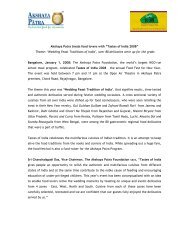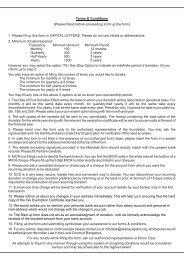The Top 100 NGOs 2013. - Akshaya Patra
The Top 100 NGOs 2013. - Akshaya Patra
The Top 100 NGOs 2013. - Akshaya Patra
You also want an ePaper? Increase the reach of your titles
YUMPU automatically turns print PDFs into web optimized ePapers that Google loves.
interests outside Belarus. As a<br />
result, the EU sanctions have hardly<br />
harmed them.<br />
<strong>The</strong> EU could, however, have a<br />
significant impact on other European-<br />
Belarus businesses. Moshensky,<br />
Shakutin and <strong>Top</strong>uzidis all have<br />
EU-based holdings, as do many other<br />
individuals who prefer to invest in<br />
Belarus from a safe external vantage<br />
point – a practice that is spreading<br />
within the domestic community as it<br />
helps to substantially lower dependence<br />
on Lukashenko. Consequently, through<br />
an ironic political twist, reinforcing<br />
sanctions on Belarusian businesses<br />
mainly hurts those – such as the<br />
promising young Aleksei Zhukov<br />
heading the Alyuteh Company –<br />
who are trying to escape the reaches<br />
of the President’s control. <strong>The</strong><br />
resultant impact when it comes to<br />
foreign investor confidence means<br />
that developing interests in the EU<br />
has become increasingly difficult<br />
for such enterprises. Potential local<br />
partners in external markets have<br />
no guarantee that, sooner or later,<br />
these good willed and more or less<br />
independent figures will not be<br />
hit adversely by further<br />
European restrictions.<br />
At the same time, alternative policies<br />
are difficult to identify. Betting on<br />
strengthening the political opposition<br />
and democratic breakthroughs is not<br />
a realistic option from a European<br />
perspective. Liberal and opposition<br />
movements are deeply divided between<br />
several leaders, none of whom stand out<br />
as obvious challengers to Lukashenko.<br />
Too ideological and radicalized, most<br />
also act, in part, from outside the<br />
country – predominantly, from Poland.<br />
This split geographical base is likely<br />
to lead to a kind of muted competition<br />
between externally based groups –<br />
especially media actors – and domestic<br />
activists. Because the latter take most<br />
of the risks in a climate of strong<br />
repression, they typically also claim<br />
the most legitimacy. Meanwhile, the<br />
external groups, with greater control<br />
over communications, try to exert some<br />
influence by favoring one faction over<br />
another. Moreover, when the wives or<br />
sisters of former presidential candidates<br />
speak as if they were representing a<br />
particular group, further confusion is<br />
added to an already blurred picture.<br />
FeaTure<br />
So far, none of these movements has<br />
been able to propose a clear, effective<br />
and realistic strategy. Arguably, it<br />
is because it would be futile to call<br />
for regime change in the current<br />
Belarusian context. As long as Russia<br />
agrees to subsidize its small neighbor,<br />
Lukashenko and his entourage will be<br />
able to resist any European pressure or<br />
public demonstrations of discontent.<br />
Minsk currently receives several billion<br />
dollars from Moscow each year to<br />
buy social peace, as well as to provide<br />
minimal economic stability.<br />
<strong>The</strong> President is therefore under no<br />
pressure to sit at a negotiating table<br />
‘<strong>The</strong> groups<br />
aligned against<br />
Lukashenko<br />
cannot count<br />
their forces, assess<br />
their audience<br />
or set achievable<br />
targets, so instead<br />
are condemned to<br />
agitate in almost<br />
empty spaces.’<br />
with what he and others would suggest<br />
are barely legitimate opposition<br />
leaders. Wishful thinking and lobbying<br />
for strengthened actions based on<br />
promoting European values can lead<br />
nowhere, at least in the immediate<br />
future. Even more so as the EU has<br />
never previously shown an inclination to<br />
enforce such a moral policy elsewhere.<br />
Although the new European Dialogue<br />
for Modernization, launched last April,<br />
includes a number of very pragmatic<br />
goals, it has not, to date, proven to be<br />
well managed or coordinated. Perhaps<br />
inevitably, it has also failed to deliver<br />
any firm results.<br />
Oddly, the demands of the Belarusian<br />
opposition do not match economic<br />
and political reality. This apparent<br />
incongruity constitutes one of<br />
Lukashenko’s major achievements.<br />
Clearly, deprived of any public platform<br />
<strong>The</strong> gloBal Journal + January & FeBruary 2013<br />
108<br />
to convey their message – whether<br />
via the media, or in an open and free<br />
political or parliamentary context –<br />
the opposition cannot be held totally<br />
responsible for its failure to appear<br />
relevant, credible and legitimate.<br />
Without the means to organize<br />
and communicate, any opposition<br />
movement would find it difficult to<br />
unify potential members and exercise<br />
a political role. <strong>The</strong> groups aligned<br />
against Lukashenko cannot count<br />
their forces, assess their audience or<br />
set achievable targets, so instead are<br />
condemned to agitate in almost empty<br />
spaces. Recent parliamentary electoral<br />
campaigns in Belarus illustrate this<br />
point. <strong>The</strong> major opposition groups –<br />
dismissed as “nobodies” by<br />
Lukashenko – boycotted last<br />
September’s elections to protest the<br />
detention of political prisoners and<br />
alleged opportunities for electoral fraud.<br />
Focused on the boycott issue, those<br />
opposition parties that did participate<br />
said nothing about economic issues,<br />
and hardly mentioned the traumatic<br />
currency crisis of 2011, much less<br />
propose any solutions. Unless Russia<br />
performs a U-turn, provoking a serious<br />
financial crash in Belarus, Lukashenko<br />
has ensured his political position for the<br />
next three years, while the opposition<br />
remains frozen. Well-informed<br />
independent experts in Minsk confirm<br />
that, “there is nothing more to do now<br />
than to wait for the next presidential<br />
election in 2015.”<br />
In Sabali, meanwhile, people tend to<br />
think that even if there were no more<br />
elections, life would not change. With<br />
a pension of around $200 dollars per<br />
month, the elderly can meet all their<br />
basic needs and live quite well.<br />
Well, that is, if one discounts traveling<br />
beyond the village or eating out at<br />
nearby restaurants. Ivan, who supervises<br />
Sabali’s first small ethno-museum<br />
set up by his son in an old house<br />
nearby, was in no hurry to vote. When<br />
the ballot box arrived he inserted his<br />
ballot paper in front of the two<br />
mandated officials, whom he knew very<br />
well. Voting itself meant nothing. He<br />
and his wife will be happy either way,<br />
watching their son help local boy made<br />
good Chizh to accomplish his dream<br />
of turning Sabali into a large touristcultural-ethnographic<br />
complex. If<br />
nothing else, their house will<br />
be repainted.<br />
CERAH, a Joint Centre of<br />
HUMANITARIAN ACTION<br />
Advanced Training for Professionals<br />
in Geneva<br />
Master’s programme and short specialised courses<br />
www.cerahgeneve.ch<br />
Mathare, Kenya © Julius Mwelu





